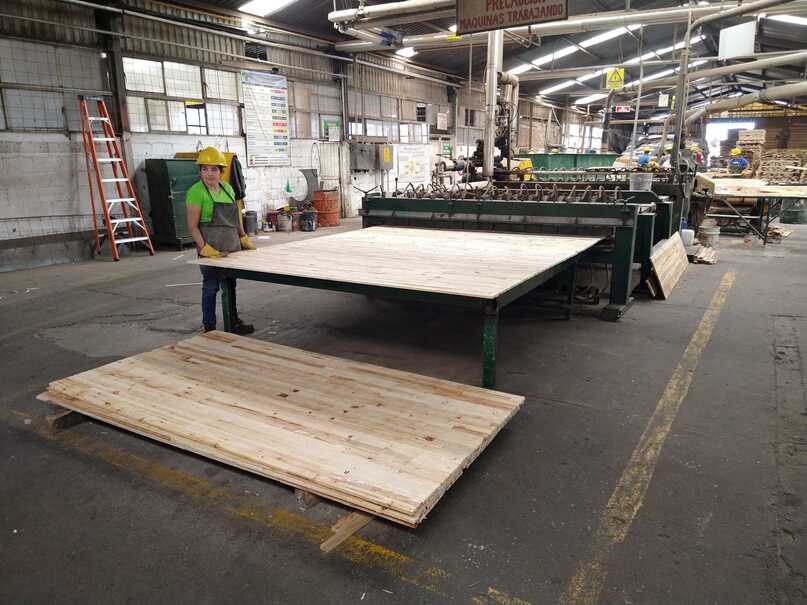Global Timber Index launches index for wood-based panels
16 May 2024

Production of a board in a factory in Mexico. Photo: CONAFOR
16 May 2024: The Global Timber Index (GTI), which tracks the performance of the timber sector in seven pilot countries, has launched its first specialized index, on wood-based panels, thereby increasing the scope and depth of the GTI and preparing the ground for the launch of other specialized GTI indices.
The GTI is a collaborative effort between ITTO, the Macao Trade and Investment Promotion Institute and the Secretariat of the Global Green Supply Chains initiative, with more than 200 enterprises and companies also participating. The aim is to facilitate business information and data exchange on the timber trade and promote collaboration among stakeholders in a stable, transparent and predictable business environment.
The GTI-Wood-based Panel Index (WBP), which covers diverse categories of plywood, fibreboard and particleboard, tracks and monitors overall trends in the wood-based panel industry in eight GTI pilot countries—Brazil, China, the Congo, Gabon, Indonesia, Malaysia, Mexico and Thailand. In 2021, the total production of wood-based panels in these eight countries was 210 million m3, which was 53% of the total global production volume of wood-based panels. The WBP is calculated based on five diffusion indices—1) production; 2) new orders; 3) inventory of raw material; 4) employees; and 5) delivery time—weighted according to their influence on the industrial economy.
In April, the GTI-WBP registered 43.1%, significantly below the threshold value of 50%, indicating that the overall prosperity of the wood-based panel industry in the pilot countries shrank in April.
In other news, China’s overall timber market maintained its upward momentum in April, amid further growth in new orders and the sound performance of the timber sector, according to the latest edition of the Global Timber Index Report, which was released yesterday. China’s GTI was at 52.3% in April, the second consecutive month it has exceeded the 50% threshold (thus indicating growth in the sector).
Less positively, GTI values were below the threshold in Brazil (49.3%), Indonesia (48.8%), Thailand (44.7%), Mexico (42.0%), the Congo (41.6%), Gabon (38.4%) and Malaysia (31.1%).
Despite the overall weaker performance in the seven countries, positive changes were evident from the GTI data. In Brazil and Thailand, the volume of export orders increased significantly compared with the previous month; in Malaysia and the Congo, the sub-index for existing orders rose, indicating improvement; and, in terms of timber supply, Indonesia’s timber sector showed an increase in harvesting and production volumes and Gabon’s downward trend in harvesting and production eased.
GTI pilot countries also continued to address issues in sustainable forest management in April. The Indonesian government indicated plans to engage in diplomacy by presenting comprehensive forest-cover data and scientific methodologies to respond to the European Union deforestation regulation, and the country’s Minister of Environment and Forestry said Indonesia has a detailed forest database, Simontana (“National Forest Monitoring System”). In the Congo, the Minister of Forest Economy highlighted the need to explore new technologies and innovative practices, such as remote sensing, drones, and internet-of-things sensors for tree health monitoring and fire prevention. In China, the government released the Ecological Protection Compensation Regulations, which give full play to the role of market mechanisms and encourage social forces and local governments to engage in ecological protection compensation by purchasing ecological products and services in accordance with market rules.
The monthly GTI Report and the GTI-Woodbased Panel (GTI-WBP) Report are available free at www.itto.int/gti
Download the latest GTI Report and the latest GTI-WBP Report.